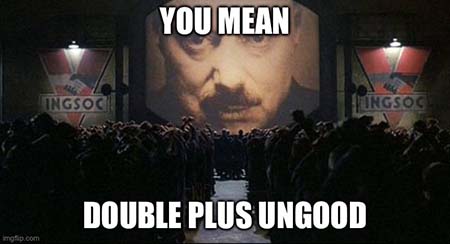Morphological Effects of Sapir-Whorf

Some Sapir-Whorf effects are morphological, they have to do with the way we use word choice to influence each other.
Some examples: Department of Defense, Chicken of the Sea, Sweetbreads, Target Rich Environment, Side-Effects...
Consider diphenhydramine, the active ingredient in Benadryl and Banophen (both antihistamines), Unisom, Sominex, Nytol (all sleep aids)...
Next: Focal Vocabularies
 The morphological Sapir-Whorf and mind control. In 1984, George Orwell imagined a world in which language was used to control thought. In "Newspeak" only positive thoughts could be spoken and dissent against the government could literally not be expressed since the words for it did not exist. For example, use of the word "bad" was outlawed. Instead, people were required to say "ungood." Of course, something that was "double plus ungood" was really bad. Does language really have such powerful effects?
The morphological Sapir-Whorf and mind control. In 1984, George Orwell imagined a world in which language was used to control thought. In "Newspeak" only positive thoughts could be spoken and dissent against the government could literally not be expressed since the words for it did not exist. For example, use of the word "bad" was outlawed. Instead, people were required to say "ungood." Of course, something that was "double plus ungood" was really bad. Does language really have such powerful effects?
The brief answer is no, but the more complex answer is subtle. Language cannot control thought the way Orwell envisioned. Human language is infinitely creative and the meanings of words change over history and depending on their context. Consider the words "bad" or "wicked." What do they mean? If something is "bad" can it be extremely good? If it's "wicked" is it evil or excellent? Words like these that can have opposite meanings are called contronyms and are common in English (and all other languages). Some more English examples: Left means both to depart and to remain (I left the theater, only two tickets are left). Off means both off and on (The alarm went off, the lights are off). Fast means both quick and stuck (she ran fast, the door was stuck fast). In French, personne means both someone and no one. In Spanish Dar Clase means either to give a class or take a class. Ignorar can mean both to ignore something and to be ignorant of something. The meanings of words is set by context and by consensus. There is no obligatory connection between a word an a meaning.
Flipping a word to mean its opposite or something quite different is nothing new. Consider the $10 word "egregious." Today, something that is egregious is truly awful. However, historically the word meant excellent or distinguished. The meaning flipped sometime in the 1500s. Or consider "nice." Its original meaning was foolish, ignorant, or senseless (here in Texas, it still sometimes means that). It didn't definitively take on its current meaning until around 1900. So, if the word "bad" is outlawed, other words would simply take its place. As long as people want to express "bad" there will be a word for it.
On the other hand, there is no question that, even though words can't force us to think in a particular way, they certainly do influence us. As we saw above, for example, calling something a "side effect" encourages people to think of it as being less important than the "effect." Whether it is or not is always an important question.
The morphological effects of Sapir-Whorf is often what is at issue in debates about so-called "political correctness." For example, no use of words can force people to think one way or another in debates about immigration. However, calling people "illegal aliens" has different connotations than calling people "undocumented persons." The choice of one or the other is a nudge toward a certain kind of thinking.
The ways in which we use word choice to influence others is a feature, not a bug. It is part of the fundamental nature of language and can't be eliminated. But, it's a good idea to be aware of it, and particularly of the way it works in media and politics.

 The morphological Sapir-Whorf and mind control. In 1984, George Orwell imagined a world in which language was used to control thought. In "Newspeak" only positive thoughts could be spoken and dissent against the government could literally not be expressed since the words for it did not exist. For example, use of the word "bad" was outlawed. Instead, people were required to say "ungood." Of course, something that was "double plus ungood" was really bad. Does language really have such powerful effects?
The morphological Sapir-Whorf and mind control. In 1984, George Orwell imagined a world in which language was used to control thought. In "Newspeak" only positive thoughts could be spoken and dissent against the government could literally not be expressed since the words for it did not exist. For example, use of the word "bad" was outlawed. Instead, people were required to say "ungood." Of course, something that was "double plus ungood" was really bad. Does language really have such powerful effects?